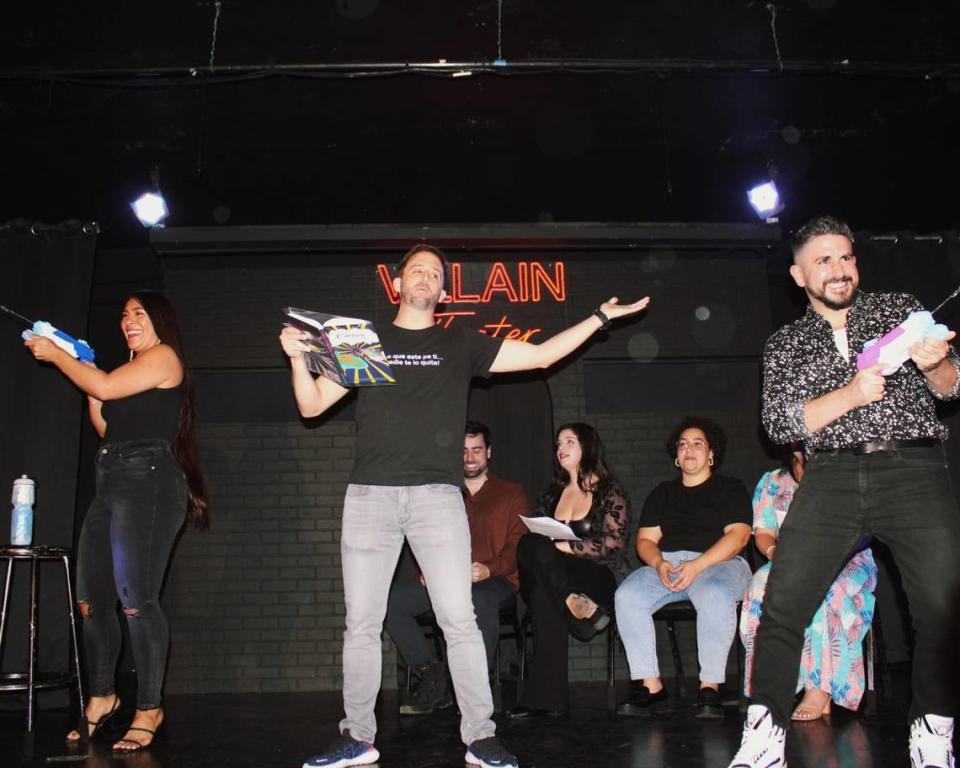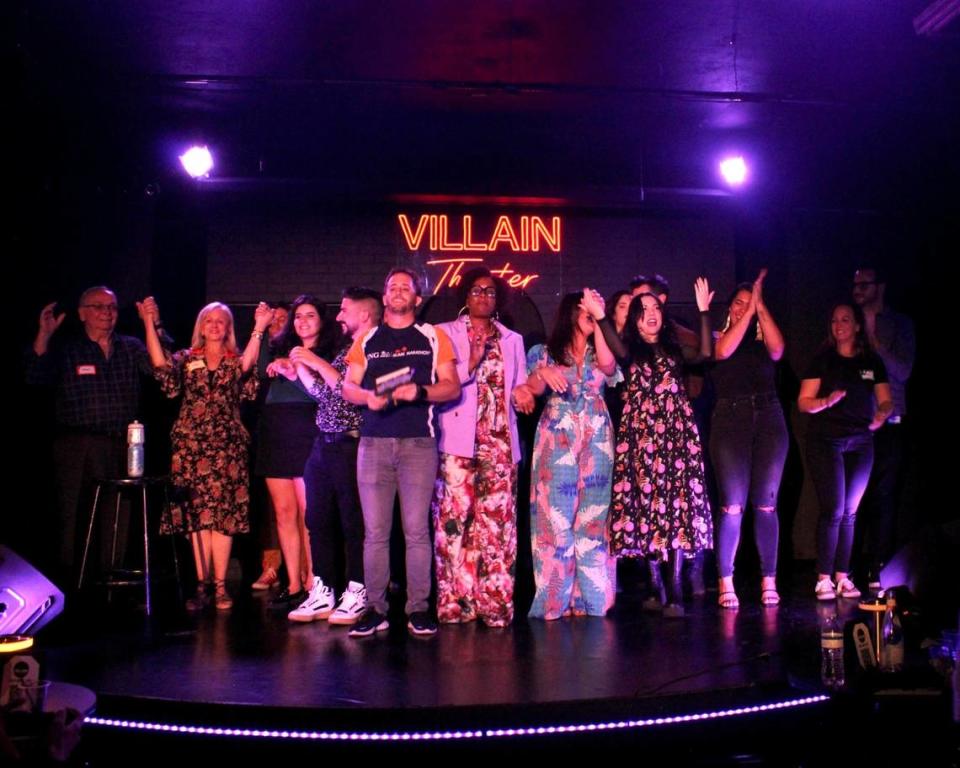Meet the God of Chisme and go on the Cafecito Odyssey in ‘The Miami Creation Myth’
In the beginning, there was nothing. No Everglades, no cafecito, no chisme. Nada.
And then, there was Miami.
Every great civilization — from the Greeks to the Mayans — has a creation myth, a story that explains how a place and its people came to be. Author Andrew Otazo took it upon himself to write Miami’s silly Spanglish story.
“The Miami Creation Myth” has arrived. For the last few years leading up to the book’s completion, Otazo has been the man behind countless Miami-themed memes making the rounds on Instagram, Twitter and your tía’s Facebook.
The book is now available to purchase at Books & Books, Martha of Miami and Amazon, if you don’t feel like leaving the house. An audiobook recorded with super thick Miami accents is forthcoming. And Friday evening, Otazo and his collaborators will be celebrating the book with a live reading and comedy show at Villain Theater in Little Haiti.
“Miami is ludicrous. It is an absurd city,” Otazo said, with love. “Nothing makes any sense. The personalities here are larger than life. So what I was going to write needed to match that level of insanity.”
And he did reach that level of insanity. Here’s the plot:
Not unlike the Book of Genesis, Miami’s fictionalized origins begin with darkness.
Eons ago, a primordial being named Pachango the Creator gave life to a petty group of godlike siblings who rule the Everglades, the sky and the ocean. A personified puff of cigar smoke called Achepé, the god of chisme, spreads gossip and rumors. The siblings fight all the time. Tropical Park is a sacred mountain. The sun and moon are lesbian lovers. You know, typical myth stuff.

But the heart of the story is the Cafecito Odyssey. Miami has fallen under a stupefying malaise, like in “One Hundred Years of Solitude.” It’s up to twin sisters, Marta and Cuquita, to traverse through the kingdoms of Miami to find the components to make cafecito and save humanity.
The “kingdoms” the twins encounter are based on real Miami-Dade neighborhoods and communities, like Little Havana, Overtown and Opa-locka. Otazo set out to represent as many neighborhoods, cultures, dialects and accents as he could, but he couldn’t do it alone.
Otazo collaborated with Miamians from all walks of life to help write about their neighborhoods. The book was made possible with the input of Miami’s Black, South American, Central American, Caribbean, Seminole and undocumented immigrant communities. The languages and dialects featured in the book include, but are not limited to, Haitian Creole; Cuban, Mexican, Guatemalan and Argentine Spanish; and Jamaican Patois. (Don’t fret, monolingual readers. There are translations in the footnotes.)
The book, while satirical and profoundly silly, tackles real issues Miamians struggle with, from invasive species attacking the Everglades to the systemic racism felt by Black residents. As a white, Cuban American from Coral Gables, Otazo didn’t want the book to only reflect his story.
“Otherwise it would be the ‘Andrew Otazo Creation Myth,’ and who wants to read that?” he said. “I want all Miamians to read it and go, ‘Yea, he got it right.’ For that to happen, I need to incorporate all sorts of experiences that I haven’t had.”

The end result was an ultra-niche project that no publisher wanted to take on. The book was “too ethnic” to sell to mainstream audiences, Otazo said, so he published it himself.
His girlfriend also encouraged him to promote the book himself with the power of memes. If you’ve shared any of the over 1,000 memes Otazo has created with a “Miami Creation Myth” logo in the corner, you know who to thank. As the memes went viral, he was able to amass a following and a readership for a newsletter.
One of his favorite memes was a map he drew over South Florida called “Miami according to a recent transplant.” (Wynwood is where the “selfie murals” are. Allapattah is “where I’m gentrifying next.”)
“The memes are just another medium. There’s nothing low class or highbrow about them,” Otazo said. “Can you communicate a message in a very succinct manner visually?”
Before the memes and mythology, Otazo went down a long winding path. He had an unhappy stint at West Point, attended the University of Miami, traveled through Latin America, worked for his dad’s construction company and became the former Mexican president’s assistant for a time. He’s lived in several cities but always, somehow, made it back to Miami, the only city in the world “where I don’t have to explain myself,” he said.
But he had to spend some time away in order to fully understand Miami, both its pros and cons. As diverse as the city is, Miami’s communities struggle to embrace each other, he says. Politicians are too caught up in “stupid vendettas” and “flashy headlines,” Otazo said. And it’s way too easy to “dehumanize people who are not like you,” he said.
“The Miami Creation Myth” can’t solve all those problems, but it can shine a light on them with humor.
“I hope that the stories are good enough that people outside can connect with them and appreciate them for what they are,” he said. “But this was not written for people outside of Miami. This is for Miami.”
‘Miami Creation Myth’ Reading
When: April 7, 10 p.m. to 11:30 p.m.
Where: Villain Theater, 5865 NE Second Ave., Miami
Tickets: $20 for general admission
Info: Free parking. Drinks and snacks available. www.villaintheater.com/all-shows/miamicreationmythreading
This story was produced with financial support from The Pérez Family Foundation, in partnership with Journalism Funding Partners, as part of an independent journalism fellowship program. The Miami Herald maintains full editorial control of this work.

